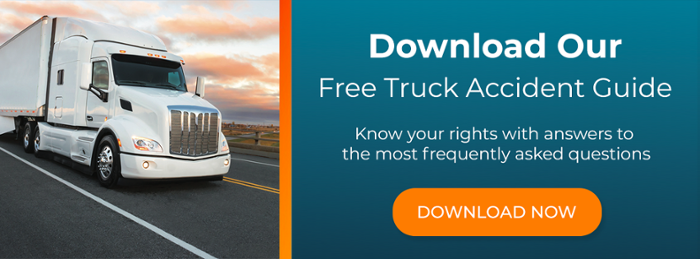CALL (800) 863-5312 FOR A FREE CONSULTATION WITH ONE OF OUR EXPERIENCED TRUCK ACCIDENT ATTORNEYS
Trucking accidents involving tractor-trailers, otherwise known as “18-wheelers” or “big rigs,” are serious events that can, and often do, result in serious injuries. Understanding how these accidents occur may help prevent or mitigate the consequences of these types of accidents. Similarly, understanding what you can do after a truck accident to protect your health and legal rights may help alleviate some of the stress that inevitably arises following a wreck.
If you or a loved one has been hurt or injured in a trucking accident and are interested in taking legal action, or to learn more about your rights, call Zinda Law Group at (800) 863-5312 for a 100% free case evaluation with our experienced trucking accident attorneys.
For a free legal consultation, call 800-863-5312
WHAT TO DO AFTER A TRUCKING ACCIDENT
1. Seek Medical Attention
The first and most important step you should take following any type of automobile accident is to seek prompt medical attention from a medical professional. Because trucking accidents often result in immediate and serious injuries, time is of the essence in seeking medical care. Even seemingly minor accidents have the potential to result in delayed-onset injuries. Whatever the case may be, calling for medical attention after a trucking accident may ensure that you receive proper treatment, thereby putting you in the best position to recover from your injuries.
Click to contact our personal injury lawyers today
2. Report the Accident
It is also important to report the accident to appropriate parties. This may include contacting local law enforcement and the trucking company itself. Reporting the accident to law enforcement is important because doing so may allow a police officer to create an official accident report, which can serve as helpful evidence and strengthen the value of your claim against the at-fault party. Reporting the accident to the trucking company itself is also important because doing so may force the company to enact further measures to prevent similar accidents from occurring in the future.
Complete a Free Case Evaluation form now
3. Document the Accident
A critical part of the post-accident process is to document the accident. Documenting the accident means creating and maintaining a personal file containing every important document relating to the accident and your resulting injuries. Examples of documents and information that should be stored in the file include:
- The name and contact information of the truck driver
- The name and contact information of the trucking company
- The license plate number and vehicle identification number (VIN) of the truck
- The names and contact information of any witnesses
- A copy of the police report
- A copy of any insurance policies
- A copy of your medical records and bills
- Photographs of the scene, injuries, physical damage
It is important to remember that documenting your accident is a very important part of the process which must not be overlooked. Properly documenting the accident may help establish the value of your claim and may help you recover fair compensation for injuries.
4. Call a Trucking Accident Attorney
Finally, you should contact an attorney with knowledge and expertise in what to do after a trucking accident. An attorney may wish to speak with you in person or over the phone to gather the facts of your case. From there, the attorney may be able to provide you with helpful legal advice regarding your options moving forward. If the attorney agrees to handle your case, the attorney may conduct a thorough investigation into the matter to further discover relevant and helpful evidence. An attorney may also be able to negotiate a favorable settlement deal with the at-fault party or the at-fault party’s insurance company.
COMMON CAUSES OF TRUCKING ACCIDENTS
Driver Fatigue
Truck drivers regularly drive for hours on end, sometimes being on the roadways for twelve or more hours a day. Given their grueling schedule, it makes sense that one of the most common causes of trucking accidents is driver fatigue. Although there are laws and regulations in place to ensure that truck drivers are well-rested, these laws aren’t always followed. Pressure to meet deadlines and reach target destinations adds even more stress to the job. These factors often combine to lead to decreased concentration or even falling asleep at the wheel.
Lack of Training
Some trucking companies neglect or entirely fail to properly train their employees. In turn, these improperly trained employees may be ill-equipped to handle and operate a commercial vehicle. As a result, these inexperienced drivers may pose an increased risk of causing a trucking accident.
Insufficient Maintenance
Trucking companies may also contribute to commercial vehicle accidents by neglecting to properly maintain company trucks. For instance, insufficient maintenance can lead to overworn tire treads, faulty brakes, or overly dim headlights. These mechanical issues may eventually serve as the primary cause of an automobile accident. In such cases, the trucking company may be held liable for negligence.
Intoxication
Just like regular motorists, truck drivers are susceptible to driving under the influence of drugs or alcohol. Alcohol and drug use can impair a driver’s focus and coordination, which may lead to a serious accident.
WHO CAN I SUE?
Truck Driver
Truck drivers may be held legally responsible for accidents caused by their negligence or reckless conduct. For instance, a truck driver who causes an accident may be held liable if he was speeding or texting while driving.
Trucking Company
The trucking company itself may also be held vicariously liable for the negligent actions of its employee if the accident occurred within the scope of the employee’s employment. A trucking company may also be held directly liable if it negligently hired, trained, or supervised the truck driver.
Other Driver(s)
Third-party drivers may also be held responsible for trucking accidents. For instance, if a third-party motorist negligent swerves into an 18-wheeler, and the 18-wheeler ends up crashing into you, you may have a claim against the third-party motorist.
Manufacturer
A manufacturer of car parts may also be held liable. These scenarios may arise when the manufacturer supplies a trucking company with a broken or defective part. For instance, if a trucking accident was caused by a defective tire, the company that sold or manufactured the tire may be held responsible. Because establishing liability on the part of a manufacturer can be difficult, it is important to consider consulting with an experienced personal injury attorney before filing any lawsuit.
COMPENSATION
Knowing how to calculate the value of your claim is an important part of the claim filing and claim settlement process. In cases involving trucking accidents, the truck driver, trucking company, or their insurance carrier faces the possibility of having to compensate the victim for the harm suffered. The damages that may be awarded to a victim of a trucking accident are separated into two general categories: economic damages and non-economic damages.
Economic damages are damages that can be accounted for and calculated. In trucking accident cases, the types of economic damages which may be available to a victim include:
- Medical bills
- Lost income (present and future);
- Loss of earning capacity; and
- Property damage
Medical bills include costs paid by the victim for services such as hospital visits, doctors’ appointments, pharmaceuticals, rehabilitation services, and physical therapy. Lost income includes lost wages due to time missed from work. If the injury prevents or impairs the victim’s ability to work beyond the date of the accident, lost income may also include the victim’s loss in earning capacity. Property damage refers to damage to the victim’s vehicle and personal belongings.
Non-economic damages are intangible losses that are subjectively evaluated by the jury in a lawsuit. Although this category of damages is difficult to quantify and calculate, non-economic damages may be more valuable than economic damages. Types of non-economic damages may include:
- Pain and suffering
- Emotional distress
- Disfigurement
- Disability
- Loss of consortium
Punitive damages are a separate category of damages that may also be awarded, depending on the jurisdiction. Punitive damages are awarded not to compensate the victim for their losses, but to punish the at-fault party. Although punitive damages are rare, this form of damages may be awarded in cases where the at-fault party’s conduct was found to be especially reckless or intentional. Punitive damages may also be awarded if the accident resulted in a wrongful death. In such cases, punitive damages may be awarded to the victim’s surviving spouse or family members if the at-fault party’s conduct was found to be reckless, egregious, or intentional.
STATUTE OF LIMITATIONS
A “statute of limitations” is a legal time-limit imposed on potential claimants. If an injured party wishing to pursue legal action neglects or otherwise fails to file a claim within the applicable statute of limitations, that party is effectively barred from litigating the claim in court.
Statutes of limitations vary from state to state. Most states have either a two or three-year statute of limitations for motor vehicle accident claims. This includes claims against trucking companies. In trucking accident cases involving injury to a child, the statute of limitations may be “tolled,” or extended, until the child reaches the age of majority, typically eighteen years old. After reaching the age of majority, the child then has two or three years to file a lawsuit.
Because a statute of limitations is a critical component of a trucking accident case, and because special rules such as tolling may apply, it is important that you consider discussing your case with a personal injury attorney. Consulting with an attorney may help you file your claim in a timely fashion.
WHAT CAN ZINDA LAW GROUP DO FOR ME?
Zinda’s team of trucking accident attorneys may fight on your behalf. In addition to years of experience representing victims of trucking accidents, our firm may provide fierce and dedicated representation to help protect your rights following a trucking accident. Zinda trucking accident attorneys may provide:
Excellent Client Service
At Zinda Law Groups, we pride ourselves on providing exemplary and unparalleled service to our clients. Throughout the entire representation, from the initial consultation up to the disposition of the case, our attorneys may guide clients through the trucking accident claim filing process.
Helpful Resources
A claim may only be as strong as the resources used to support it. Thankfully, Zinda Law Group has access to many resources that may be used to build a claim. Our offices have handled large and complex cases, conducted thorough interviews with the necessary parties, hired expert witnesses, and utilized state of the art technology.
Experienced Negotiators
Effectively communicating with insurance companies and claims adjusters is a major part of a truck accident claim. Zinda Law Group’s truck accident attorneys have years of experience negotiating with insurance companies and claims adjusters. Our team of attorneys may negotiate on your behalf to ensure that multi-million-dollar insurance providers do not take advantage of you.
Litigation-Focused Representation
Zinda Law Group’s attorneys also have years of experience litigating claims from beginning to end. Because we treat every case as if it is going to trial, we give your case the attention-to-detail it deserves.
If you are interested in pursuing legal action, or to learn more about what to do after a trucking accident, contact the experienced trucking accident attorneys at Zinda Law Group at (800) 863-5312 for a free consultation. While you focus on recovering from your injuries, our team is focused on protecting your rights. You don’t pay anything unless we win your case.
Meetings with attorneys by appointment only.
Call or text 800-863-5312 or complete a Free Case Evaluation form










